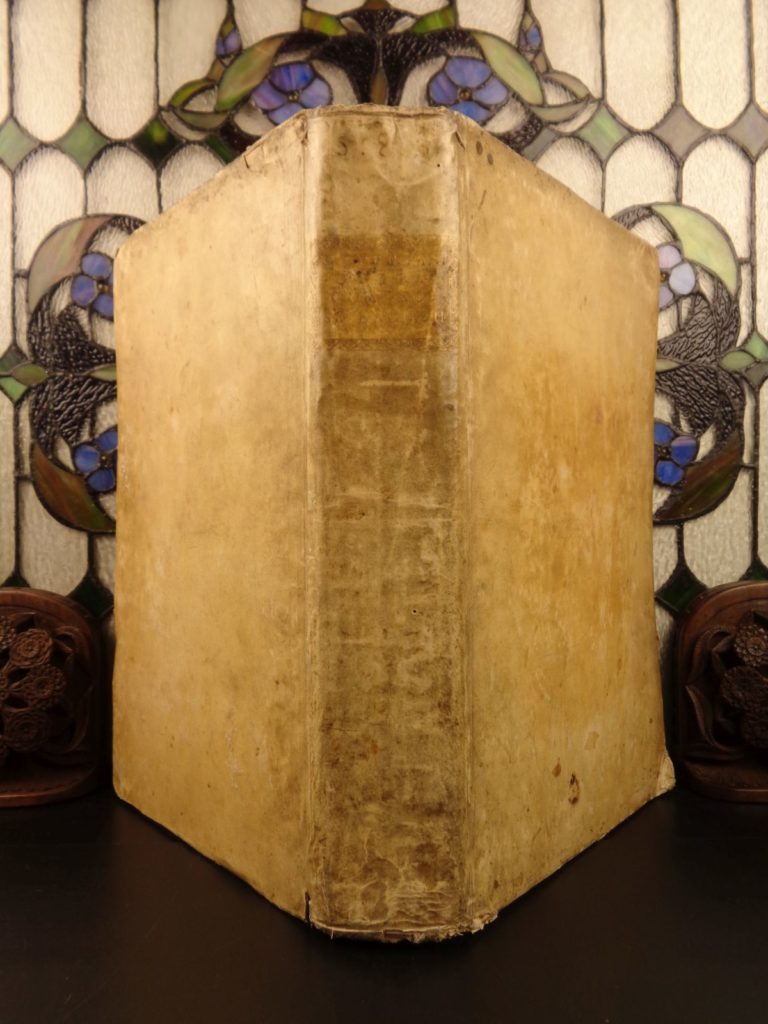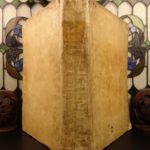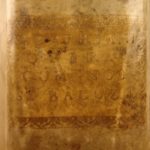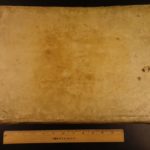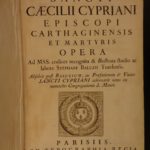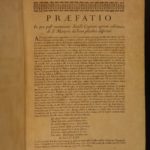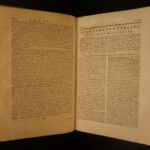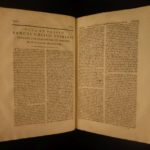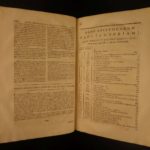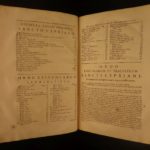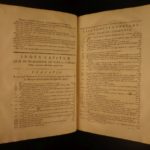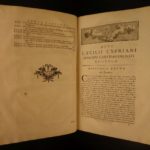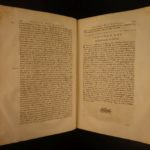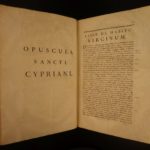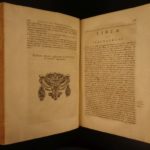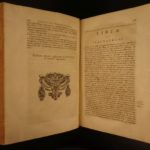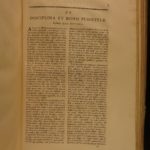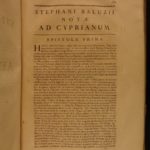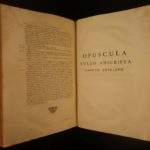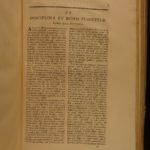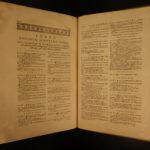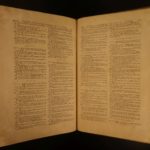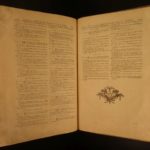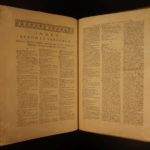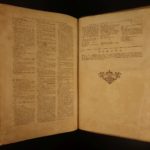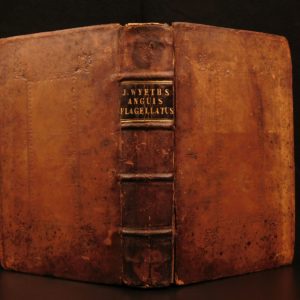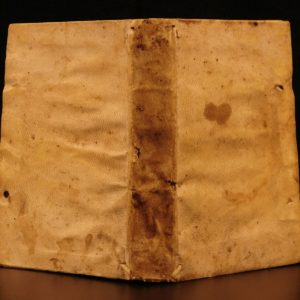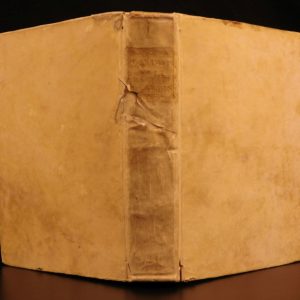1726 Complete Works of CYPRIAN Bishop of Carthage Africa Martyrology Martyrdom
An 18th-century printings of the works of Cyprian.
Cyprian (c. 200 – 258 AD) was bishop of Carthage and an important Early Christian writer, many of whose Latin works are extant. He was born around the beginning of the 3rd century in North Africa, perhaps at Carthage, where he received a classical education.
We find this same rare book elsewhere at $1,700
1726 Complete Works of CYPRIAN Bishop of Carthage Africa Martyrology Martyrdom
HUGE VELLUM FOLIO ~15.25in X 10.5in
An 18th-century printings of the works of Cyprian.
Cyprian (c. 200 – 258 AD) was bishop of Carthage and an important Early Christian writer, many of whose Latin works are extant. He was born around the beginning of the 3rd century in North Africa, perhaps at Carthage, where he received a classical education.
We find this same rare book elsewhere at $1,700
Main author: Etienne Baluze; Prudent Maran; Cyprian
Title: Sancti Cæcilii Cypriani … opera ad MSS. codices recognita & illustrata studio ac labore Stephani Baluzii … Absolvit post Baluzium, ac præfationem & vitam Sancti Cypriani adornavit unus ex monachis congregationis S. Mauri [i.e. Prudent Maran]. [With “Arnoldi abbatis Bonæ-Vallis opera.”
Published: Paris: Druckerei, 1726.
Language: Latin
Notes & contents:
- 1st edition thus
FREE SHIPPING WORLDWIDE
Wear: wear as seen in photos
Binding: tight and secure vellum binding
Pages: complete with all cxlvii + 608 + cccxxlvi pages; plus indexes, prefaces, and such
Publisher: Paris: Druckerei, 1726.
Size: ~15.25in X 10.5in (38.5cm x 26.5cm)
FREE SHIPPING WORLDWIDE
Shipping:
Very Fast. Very Safe. Free Shipping Worldwide.
Satisfaction Guarantee:
Customer satisfaction is our first priority. Notify us within 7 days of receiving your item and we will offer a full refund guarantee without reservation.
$599
Cyprian (Latin: Thaschus Cæcilius Cyprianus; c. 200 – September 14, 258 AD)[1] was bishop of Carthage and an important Early Christian writer, many of whose Latin works are extant. He was born around the beginning of the 3rd century in North Africa, perhaps at Carthage, where he received a classical education. Soon after converting to Christianity, he became a bishop in 249. A controversial figure during his lifetime, his strong pastoral skills, firm conduct during the Novatianist heresy and outbreak of the plague, and eventual martyrdom at Carthage vindicated his reputation and proved his sanctity in the eyes of the Church. His skillful Latin rhetoric led to his being considered the pre-eminent Latin writer of Western Christianity until Jerome and Augustine.[3]
Contents [hide]
1 Early life
2 Contested election as bishop of Carthage
3 Controversy over the lapsed
4 Persecution under Valerian
5 Writings
6 Sources on Cyprian’s life
7 Veneration
8 References
9 Sources
10 External links
Early life[edit]
Cyprian was born into a rich pagan family of Carthage, sometime during the early third century. His original name was Thascius; he took the additional name Caecilius in memory of the priest to whom he owed his conversion.[4] Before his conversion, he was a leading member of a legal fraternity in Carthage, an orator, a “pleader in the courts”, and a teacher of rhetoric.[5] After a “dissipated youth”, Cyprian was baptised when he was thirty-five years old,[2] c. 245 AD. After his baptism, he gave away a portion of his wealth to the poor of Carthage, as befitted a man of his status.
In the early days of his conversion he wrote an Epistola ad Donatum de gratia Dei and the Testimoniorum Libri III that adhere closely to the models of Tertullian, who influenced his style and thinking. Cyprian described his own conversion and baptism in the following words:
When I was still lying in darkness and gloomy night, I used to regard it as extremely difficult and demanding to do what God’s mercy was suggesting to me… I myself was held in bonds by the innumerable errors of my previous life, from which I did not believe I could possibly be delivered, so I was disposed to acquiesce in my clinging vices and to indulge my sins…. But after that, by the help of the water of new birth, the stain of my former life was washed away, and a light from above, serene and pure, was infused into my reconciled heart… a second birth restored me to a new man. Then, in a wondrous manner every doubt began to fade…. I clearly understood that what had first lived within me, enslaved by the vices of the flesh, was earthly and that what, instead, the Holy Spirit had wrought within me was divine and heavenly.
— Cyprian, Ad Donatum, 3-4
Contested election as bishop of Carthage[edit]
Not long after his baptism he was ordained a deacon, and soon afterwards a priest. Some time between July 248 and April 249 he was elected bishop of Carthage, a popular choice among the poor who remembered his patronage as demonstrating good equestrian style. However his rapid rise did not meet with the approval of senior members of the clergy in Carthage,[6] an opposition which did not disappear during his episcopate.
Not long afterwards, the entire community was put to an unwanted test. Christians in North Africa had not suffered persecution for many years; the Church was assured and lax. Early in 250 the “Decian persecution” began.[7] Roman officials demanded that all citizens sacrifice to the pagan gods, but the Christian bishops were especially targeted.[citation needed] Cyprian chose to go into hiding rather than face potential execution. While some clergy saw this decision as a sign of cowardice, Cyprian defended himself saying he had fled in order not to leave the faithful without a shepherd during the persecution, and that his decision to continue to lead them, although from a distance, was in accordance with divine will. Moreover, he pointed to the actions of the Apostles and Jesus himself: “And therefore the Lord commanded us in the persecution to depart and to flee; and both taught that this should be done, and Himself did it. For as the crown is given by the condescension of God, and cannot be received unless the hour comes for accepting it, whoever abiding in Christ departs for a while does not deny his faith, but waits for the time…” [8]
Controversy over the lapsed[edit]
The persecution was especially severe at Carthage, according to Church sources. Many Christians fell away, and were thereafter referred to as “lapsi” (the fallen). [7] The majority had obtained signed statements (libelli) certifying that they had sacrificed to the Roman gods in order to avoid persecution or confiscation of property. In some cases Christians had actually sacrificed, whether under torture or otherwise. Cyprian found these libellatici especially cowardly, and demanded that they and the rest of the lapsi undergo public penance before being readmitted to the Church.
However, in Cyprian’s absence, some priests disregarded his wishes by readmitting the lapsed to communion with little or no public penance. Some of the lapsi presented a second libellus purported to bear the signature of some martyr or confessor who, it was held, had the spiritual prestige to reaffirm individual Christians. This system was not limited to Carthage, but on a wider front by its charismatic nature it clearly constituted a challenge to institutional authority in the Church, in particular to that of the bishop. Hundreds or even thousands of lapsi were re-admitted this way, against the express wishes of Cyprian and the majority of the Carthaginian clergy, who insisted upon earnest repentance.[3]
A schism then broke out in Carthage, as the laxist party, led largely by the priests who had opposed Cyprian’s election, attempted to block measures taken by Cyprian during his period of absence. After fourteen months, Cyprian returned to the diocese and in letters addressed to the other North African bishops defended his having left his post. After issuing a tract, “De lapsis,” (On the Fallen) he convoked a council of North African bishops at Carthage to consider the treatment of the lapsed and the apparent schism of Felicissimus (251). Cyprian took a middle course between the followers of Novatus of Carthage who were in favour of welcoming back all with little of no penance, and Novatian of Rome who would not allow any of those who had lapsed to be reconciled.[9] The council in the main sided with Cyprian and condemned Felicissimus, though no acts of this council survive.
The schism continued as the laxists elected a certain Fortunatus as bishop in opposition to Cyprian. At the same time, the rigorist party in Rome, who refused reconciliation to any of the lapsed, elected Novatian as bishop of Rome, in opposition to Pope Cornelius. The Novatianists also secured the election of a certain Maximus as a rival bishop of their own at Carthage. Cyprian now found himself wedged between laxists and rigorists, but the polarization highlighted the firm but moderate position adopted by Cyprian and strengthened his influence, wearing down the numbers of his opponents. Moreover, his dedication during the time of a great plague and famine gained him still further popular support.[9]
Cyprian comforted his brethren by writing his De mortalitate, and in his De eleemosynis exhorted them to active charity towards the poor, setting a personal example. He defended Christianity and the Christians in the apologia Ad Demetrianum, directed against a certain Demetrius, in which he countered pagan claims that Christians were the cause of the public calamities.
Category
Religion
Authors
Etienne Baluze Cyprian Prudent Maran
Printing Date
18th Century
Language
Latin
Binding
Vellum
Book Condition
Good
Collation
Complete

